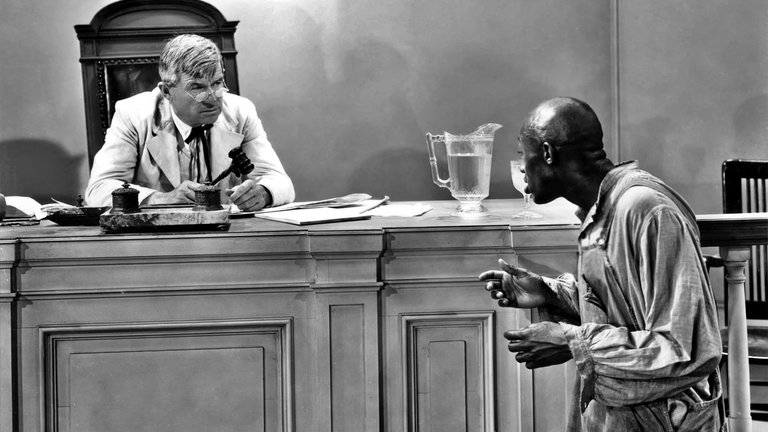Film Review: Judge Priest (1934)

Hollywood has always exploited people’s tendency to view the past, especially the more distant and less palatable aspects of it, through a rosy lens. This exploitation of nostalgia was particularly effective in the 1930s, when cinemagoers desperately needed an escape from the harsh realities of the Great Depression. In the case of the 1934 comedy Judge Priest, that escape was found in the rural Kentucky of 1890, resulting in a film that became one of the biggest hits of its time.
The film was based on stories by the humorist Irving S. Cobb, whose tales of the amiable Judge Priest and the sleepy town of Fairfield, Kentucky had been inspired by author’s early years. The plot begins when the judge, played by the Will Rogers, as he presides over a case involving the accused chicken thief, Jeff Poindexter (played by Stepin Fetchit), and continues with Priest navigating through political rivalries and personal revelations that unfold in the community.
While director John Ford is best known for his classic westerns, "Judge Priest" is a period comedy that he named as his personal favorites. Ford's enormous skill in handling the relatively uneventful plot is evident, as he transforms it into an opportunity for a delightful character study and a lovable depiction of the seemingly idyllic life in a sleepy rural Southern town. The director cleverly adds just enough pathos and drama to his comedy, making it more real and resonant, particularly in the scene where Priest visits his family's grave and the emotional finale, where the character played by Henry B. Walthall, actor famous for his role in The Birth of a Nation, reminds the audience of the carnage and human toll of the Civil War.
The biggest asset of the film, however, is the incomparable Will Rogers, who was arguably the most popular entertainer in 1930s America. Rogers' portrayal of the laid-back judge, who relies more on common sense than the letter of the law, seemed tailor-made for his talent, and the success of Judge Priest cemented his status as the most profitable Hollywood star of his time.
While the film's charm and entertainment value are undeniable, some of the casting choices and the treatment of race may prove problematic for today's "woke" audience. The most obvious example is the casting of Stepin Fetchit, an African American actor who plays a bumbling, lazy man, embodying some of the most vile racial stereotypes. Although Fetchit's character is ultimately befriended by the protagonist, and the actor was respected by the African American community as the first of their stars in Hollywood and becoming a millionaire, his role in this film is still easy to criticise as a representation of everything that was wrong in 1930s America.
The casting of Hattie McDaniel, who would later go on to win a ground-breaking Oscar for her role in Gone with the Wind, as the sympathetic Aunt Dilsey, is less problematic. However, the fact that she sings the state anthem "My Old Kentucky Home," which includes questionable lyrics that use an outdated and offensive term for African Americans, is a reminder of the complex racial landscape of the time.
To his credit, director John Ford attempted to show that the state of affairs in the post-Reconstruction South was anything but idyllic. The dialogue mentions the lynching of African Americans, and there is even a reference to Priest saving Poindexter from a lynching. This scene was actually shot by Ford but later edited out by the studio, wary of the political controversies in a country where a large part was still institutionally racist. Ford would later correct this in his 1953 remake, The Sun Shines Bright, which included a similar scene.
Viewed without political and historical considerations, Judge Priest is an entertaining comedy that doesn't suffer much from the obligatory romantic subplot or some plot developments that may seem too obvious. It can be appreciated as a delightful depiction of a bygone era, much like Fellini's Amarcord, which captures the essence of an ancient past.
The collaboration between Ford and Rogers was a fruitful one, and the two men were reunited the following year for the production of Steamboat Around the Bend. Tragically, their partnership was cut short by Rogers' untimely death in a plane crash, leaving behind a legacy of films that continue to captivate and entertain audiences to this day.
RATING: 7/10 (+++)
Blog in Croatian https://draxblog.com
Blog in English https://draxreview.wordpress.com/
InLeo blog https://inleo.io/@drax.leo
Hiveonboard: https://hiveonboard.com?ref=drax
Rising Star game: https://www.risingstargame.com?referrer=drax
1Inch: https://1inch.exchange/#/r/0x83823d8CCB74F828148258BB4457642124b1328e
BTC donations: 1EWxiMiP6iiG9rger3NuUSd6HByaxQWafG
ETH donations: 0xB305F144323b99e6f8b1d66f5D7DE78B498C32A7
Posted using CineTV

Congratulations @drax! You have completed the following achievement on the Hive blockchain And have been rewarded with New badge(s)
You can view your badges on your board and compare yourself to others in the Ranking
If you no longer want to receive notifications, reply to this comment with the word
STOPCheck out our last posts: